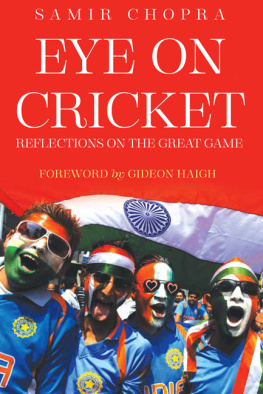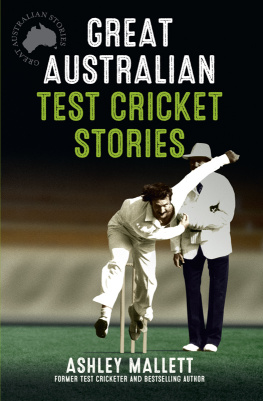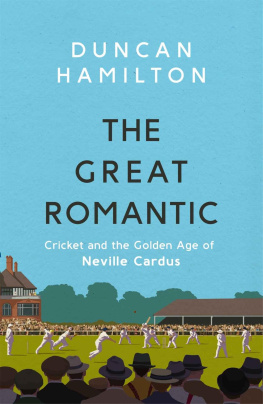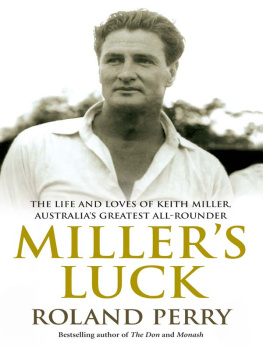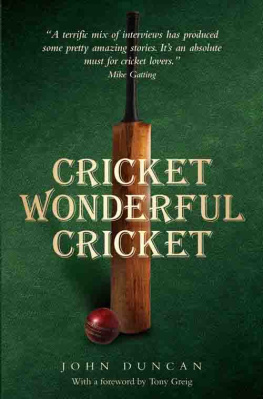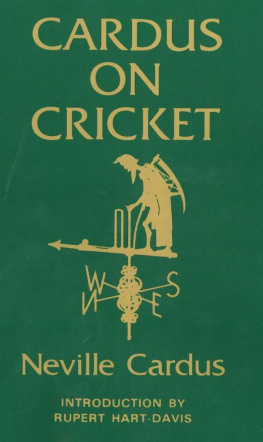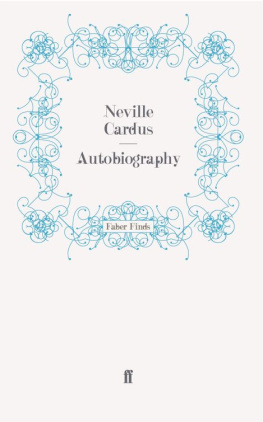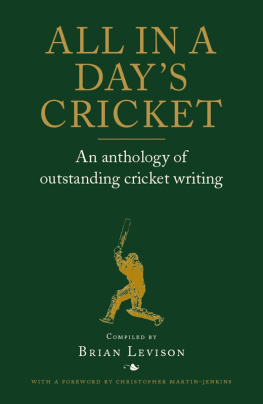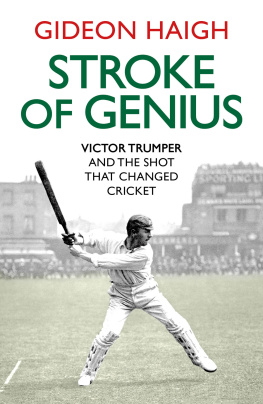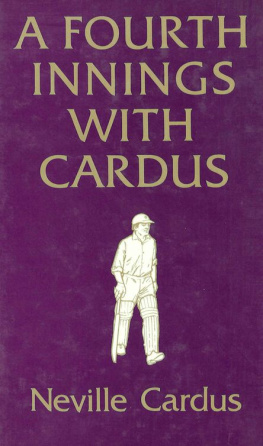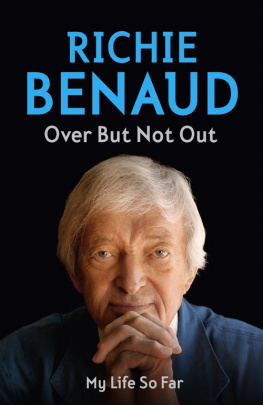About the Author
Neville Cardus (18881975) was born in Rusholme, Manchester and began writing about cricket for the Manchester Guardian in 1919 when he was sent to cover a match at Old Trafford. He was also for many years the papers chief music critic. His many books included Days in the Sun , Good Days and Australian Summer . He was knighted in 1966. In the eulogy at his memorial service the cricket historian Alan Gibson said that just as Macaulay changed the course of the writing of history, Cardus changed the course of the writing of cricket. He showed what could be done. He dignified and illuminated the craft.
Gideon Haigh has been praised as our greatest living cricket writer. His books include Mystery Spinner , his prizewinning biography of Jack Iverson, The Big Ship , on the life of the Australian Test captain Warwick Armstrong, and Stroke of Genius , about Victor Trumper. He lives in Melbourne, Australia.
The publisher gratefully acknowledges the assistance of Fiona Hertford-Hughes, copyright holder of the Estate of Neville Cardus, in putting this selection of his work together.
First published 2019 by
Safe Haven Books Ltd
12 Chinnocks Wharf
42 Narrow Street
London E14 8DJ
www.safehavenbooks.co.uk
This ebook edition published 2020
The Estate of Neville Cardus 2019
Introduction Gideon Haigh 2019
The moral right of the Estate of Neville Cardus to be identified as the Author of this Work has been asserted in accordance with the Copyright, Designs and Patents Act 1988.
All rights reserved.
No part of this book may be reproduced or utilised in any form or by any means, electronic or mechanical, including photocopying, recording or by any information storage and retrieval system, without permission in writing from Safe Haven Books Ltd.
Every effort has been made to contact the copyright holders of material in this book. Where an omission has occurred, the publisher will gladly include acknowledgement in any future edition.
A catalogue record for this book
is available from the British Library.
ISBN 978 1 9160453 8 5
13579108642
20202022202420232021
Introduction
by Gideon Haig
For a long time, Sir Neville Cardus was regarded as crickets greatest writer; then he wasnt. The two perspectives may be related. What one generation exalts, the next is almost bound to despise. But there is something odd about his fall from grace, because it often feels more concerned with whether it is OK to like Cardus, and to arise from assumptions about Cardus rather than involving the effort of actually reading him.
To be fair, Carduss canonical status was never universally agreed. Ah dont like thy writing, Mester Cardus, Yorkshires Arthur Mitchell purportedly reproached him. Its too fancy. But he is especially ill-suited to these aggressively neophilial and levelling times. Sir Neville Cardus: why, the very name is anachronistic. He must have been a posh boy, mustnt he? Didnt he throw in allusions to classical music? Didnt he use fancy metaphors? Ignoring that classical music was in Carduss time perfectly popular culture, not least in the Manchester of his boyhood. Ignoring that in reaching outside the sporting vernacular for a fresh perspective on participants and feats, Cardus was arguably more in tune with the sportswriting of today than his own.
Ah, but he was a snob, wasnt he? Now, there is something to this. Cardus was dedicated to the memory of the cricket and the cricketers of his pre-World War I youth, with a partiality to the pedigree amateur batsmen who defined it or indeed, it should be said, who he helped define it, for it was Cardus who pressed into common coinage the notion of an Edwardian Golden Age of Cricket. Likewise could he be nostalgically deprecating of what came after, a lamentation of the nations lost peace and plenty. He could be glib, facile. He was assuredly no historian you would no sooner rely on factual actuality in a piece of Carduss than in a Trump tweet.
But show me a sports writer not occasionally star-struck, not periodically jaded, who does not have favourites and harbour prejudices. At least Carduss were sincere rather than sycophantic. When he derided Bloggs of Blankshire, furthermore, he was making a point every cricket watcher can understand that there are players who hold, for all sorts of reasons, greater personal and aesthetic appeal than others. The scoreboard, he maintained, will not get anywhere near the secret of Woolley. It can only tell us about Bloggs. Those greats, too, have better days than others: Only mediocrity is always at its best.
Nowadays it is a term of approbation to refer to a sports writer as possessing the enthusiasm of the fan. Cardus was here a pioneer. Few cricket writers have so often mentioned the perspective of an everyday spectator, for a simple reason: being not an ex-player, he was well acquainted with the cheap seats by the time he gravitated to journalism in his early thirties. So when he described the post-1947 Denis Compton, for example, he saw it from the terraces: In a world tired, disillusioned and bare, heavy with age and deprivation, this happy cricketer spread his favours everywhere, and thousands of us, young and old, ran his runs with him. Here at any rate was something unrationed. There were no coupons in an innings by Compton.
Oh yes, one last thing: the parrot cry that Cardus made things up. Some of his stories were too good to be true because they werent. But literary licence, as Carduss first biographer Christopher Brookes observed, is nothing so new: After all, Shakespeare missed Agincourt. Its also worth considering the factual economy of Carduss era, unassisted by the real-time stat and the media soundbite, based on the unaided eye versus the unyielding distance. Writing fifty years ago, Cardus had this to say about his starting out as a reporter of county cricket:
Silence reigned supreme. There was no specialist statistician to inform us that so-and-so had bowled so many overs, or that so-and-so had completed his 50 in two and a half hours. We had to make our own statistical recordings. Jimmy Catton, of the now defunct Manchester Evening Chronicle , himself wrote down a ball-by-ball analysis of each bowler, also detailing the value and direction of every stroke. So did all the other cricket reporters.
It was Cardus, in fact, who became the first correspondent to liberate cricket journalism from the menial transcription of action, who discerned in the game the scope for a literary imagination. Cardus is not, then, to be understood merely by his own writing, but from cricket in newspapers before and after him. Never before had press box journalism been worth reading for its own sake: as John Arlott put it, Cardus forced cricket into a position where the literate had to notice it, and, in doing so, compelled an improvement in the general standard of writing about the game. He provided word pictures where there were as yet no serious photographs. He offered reflections on crickets place in public affection where there was so far scant thought. And if this involved the occasional tactful fiction, then so did his life.


